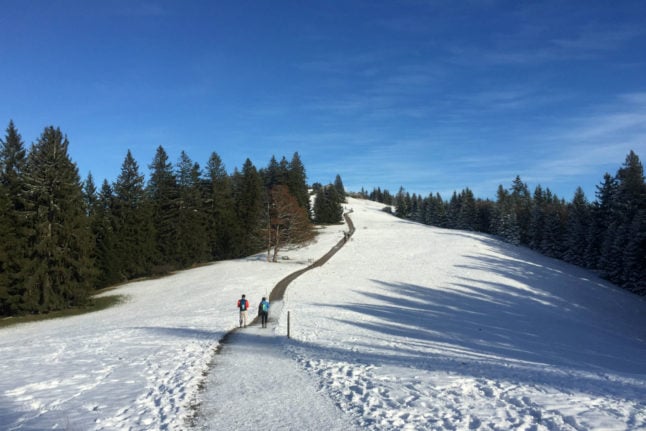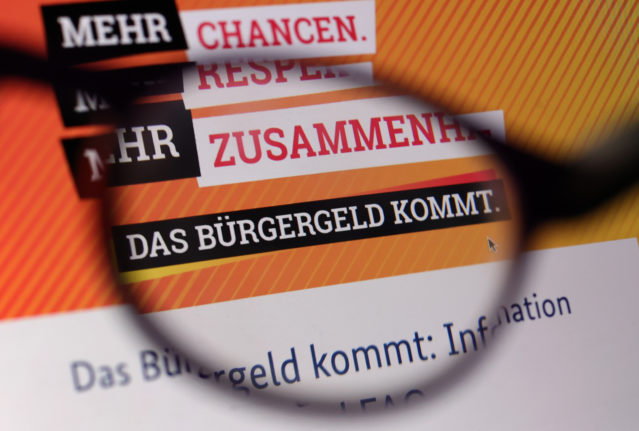Germany is currently discussing banning firecrackers completely on New Year’s Eve. But the majority of Germans aren’t protesting the possibility.
According to a new survey from YouGov, almost two thirds of those surveyed are fully in favour of putting a halt to the explosive tradition this year, whereas only 25 percent are against it, and 10 percent have no opinion.
Bavaria's State Premier Markus Söder (CSU) told public broadcaster ARD that Christmas should be “freer” in terms of restrictions, “but New Year's Eve should be more consistent again”. For Silvester (New Year’s Eve) he would like to see a ban on firecrackers or alcohol in large squares.
Yet some politicians are pushing for the tradition that typically rings in the New Year throughout Germany.
“A general banning of firecrackers is not necessary,” Interior Minister Horst Seehofer (CSU) said. “Fireworks must be possible on New Year's Eve despite coronavirus.”
German vocabulary word: firecracker – (der) Böller
READ ALSO: Police and politicians call for ban on New Year’s Eve fireworks

Archive photo shows NYE fireworks in Berlin. Photo: DPA
Volunteers sought for Berlin vaccination centres
Berlin is looking for more than 1,000 assistants for the new coronavirus vaccination centres it’s planning by the end of the year.
For each of the six locations, around 200 trained helpers will be needed, Albrecht Broemme, the coordinator for setting up the centre, told Berlin-Brandenburg regional broadcaster rbb on Saturday.
READ ALSO: Germany says coronavirus vaccinations 'could start before end of year'
The vaccination centres are to be set up in Exhibition Hall 11, in the closed-down airports Tegel and Tempelhof, in the Velodrom in Prenzlauer Berg, in the Erika-Heß-Eisstadion in Wedding and in the Arena in Treptow.
According to Health Senator Dilek Kalayci (SPD), up to 20,000 people can be vaccinated daily in the six centres as soon as the vaccine is available.
Germany-wide, dozens of vaccination centres are being planned.
German vocabulary word: assistants – (die) Helfer
Price sinks for half a million flats in Berlin
The second level of the capital’s rent freeze law went into effect on Monday. The first of its kind in Germany, the new law forbids landlords to charge a rent that is above a certain price threshold.
In the first phrase of the law, in effect since February 23rd, rents for around 1.5 million capital city apartments have already been frozen at the June 2019 level until 2025. They may not rise again until 2022 – according to the current level, by a maximum of 1.3 percent annually.
If an apartment is rented out again, the landlord must adhere to upper limits and the last rent.
As of Monday, rents must be reduced if they are more than 20 percent above the upper limits set by the city-state of Berlin. These are calculated on the basis of the year of construction, furnishings and location of the apartment and range between €3.92 and €9.80 per square meter.
German vocabulary word: rent freeze – (der) Mietendeckel
Tweet of the day
Temperatures around Germany took a nosedive on Saturday, reaching a chilly 0 to 3C in many places. Yet that’s not such a bad thing if you’re hiking through the scenic Bavarian Alps, as this tweet and photos from Munich-based Shelley Pascual shows. Amid the lockdown, many people in Germany are heading to their closest hiking trail.
Spotted snow for the first time this season ?❄️? #Heiglkopf #BavarianAlps pic.twitter.com/nMVrpUjoMi
— Shelley Pascual (@shelleypascual) November 21, 2020
Home Office Drawbacks
The benefits of working remotely in Germany have often been hailed but there are also drawbacks, a new survey revealed on Monday.
Thirty seven percent of the managers and personnel directors surveyed in an Ifo Institute survey believe that the general input of employees working from home has deteriorated. However, 44 percent felt productivity remained the same, whereas 18 percent saw better job performance than at the usual workplace.
READ ALSO: Home Office makes employees more productive and happy, study finds
Compared to personal contact at the workplace, 59 percent of those surveyed felt that collaboration at home suffers, with only seven percent finding it to be even better.
Two-thirds of the companies surveyed said that they still wanted to make greater use of Home Office in the long term.
In addition, the respondents felt there was more difficult communication between employees, a lack of coordination, difficulties in combining work and childcare, as well as additional workload and stress for employees.
German vocabulary word: job performance/(die) Arbeitsleistung
Smartphone shutdown
Did you have trouble using your phone on Monday afternoon? You’re not alone, as more than 100,000 Vodafone customers lost connection to the Telecom provider due to regional disruptions, the company wrote on Twitter about the issue that affected 4G/LTE mobile data.
From 2pm on, tens of thousands of customers around Germany took to the Internet to complain about the disturbance.
German vocabulary word: disturbance – (die) Störung




 Please whitelist us to continue reading.
Please whitelist us to continue reading.
Organised, public fireworks displays should be the way to go under normal circumstances. In 2020? A total ban.
We don’t need more irresponsible, drunk people jeopardising and straining the fantastic front liners. Idiots and fireworks never mix well. Please ban all private use and purchase of fireworks this year.